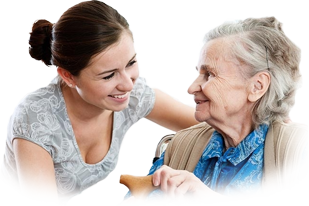 For the Family Caregiver
For the Family Caregiver
For the one leading the charge, the drains are not always visible.
Care giving can be just as demanding as a full time job. Days are long and it is hard to take a break. This is why it is so important to watch for your own symptoms as a caregiver. You want to be as good for yourself as you are for your loved one who depends on you.
Are you…
 missing a lot of work?
missing a lot of work?- not exercising and instead eating a lot of unhealthy foods?
- having nightmares or disturbing dreams?
- feeling lethargic or maybe even depressed?
- angered by minor issues, or are you impatient with your loved one?
 MAKING CARE
MAKING CARE
GIVING WORK
While keeping yourself
and your family strong
Family care giving is the single biggest contribution to an older adult being able to stay in their own home and age in place. Caregivers do everything from transporting the older adult to and from medical appointments to coordinating the services of other medical providers, managing multiple medications and advocating on behalf of their family member. It takes time and weighs heavily on the caregiver who still must balance everything against a full-time job, parental responsibilities and a marital partner. Caregivers often don’t get much explicit attention as part of the tremendous contributions.
The most recent report on family care giving published by AARP is required reading for caregivers and their families. It provides a sense of the huge and important work that caregivers are providing for their families in America today.
Creative Care Management recommends three points that cannot be repeated often enough.
- One, caregivers’ contributions need to be appreciated by the entire family who benefits.
- Two, the whole family also needs to help in caring for the caregiver.
- Three, it takes a village for all of the above.
PEEKING OVER THE WALL
After surviving the climb
5 Steps Towards becoming a Better Caregiver:
 Become educated about your loved one’s condition in order to be as effective as you can be.
Become educated about your loved one’s condition in order to be as effective as you can be.- Recognize that you are not superman or superwoman; set some limits on what you and others can expect from you.
- Do not beat yourself up about feeling angry, afraid or even resentful; instead find ways to vent
- Talk is important as a principal way to vent – especially to a therapist, counselor, clergy member, and even trusted friends.
- Lift smart. As a caregiver, be smart about not hurting your back when lifting, pushing and pulling; keep yourself in shape and use an assistive waistband if your physician recommends it.
For more tips for the caregiver, Chicago IL care resources and more, don’t forget to visit Charlotte’s Blog and please make sure to learn more about what we do at elder care services page.

THE CAREGIVER BLUES
Building a Prevention Strategy
With the amount of stress and pressure caregiving can produce, many choose to ignore signs of caregiver depression. The sad irony is that the caregiver feels guilty about even talking about the dark cloud that seems to be hanging over them, guilty that they do not feel the fulfillment of taking care of the parent who once took care of them. This, despite the fact that the caregiver of an older adult more often than not has other family responsibilities already.
More than 20 million Americans suffer from depression, and family caregivers are more likely than the average person to get something that is not just the “blues.” We all recognize the time and work that a caregiver puts in to help an older adult, but they also may be giving up the time they would have been spending with their spouse or significant other –or the nights out with friends and acquaintances, the moments during any given week that would give a break from the routine, make them laugh or fulfill them.
Love, Live, Laugh
Tips for Caregiver Blues
 Include you; make time each day to do something that delights, relieves or distracts you.
Include you; make time each day to do something that delights, relieves or distracts you.- Make lists; prioritize your caregiving duties, make lists and you will see you are making progress even when there remains more to do.
- Request help; appreciate that it is gratifying to the others whom you may ask for help to be of help to you and your elder.
- Leverage your abilities; the others who can give you respite are actually better equipped for what you may delegate than you are.
- Make yourself laugh; hard work like caregiving can seem devoid of fun, so you have to take time to have some fun.



